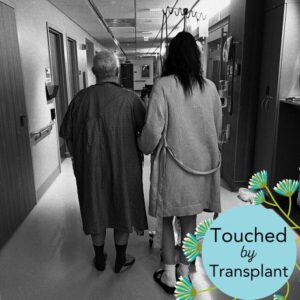Jennifer Alley was born with myopathic intestinal pseudo-obstruction, a chronic rare disease. She received an intestinal transplant in 2004 with support from her husband and son.

How has the transplant impacted your life?
I have been sick since birth. Before my transplant, I was always in and out of the hospital and I had three internal tubes: one to empty my stomach, one to empty my bladder and one that served as a permanent IV line in my chest to deliver total parenteral nutrition (TPN). My body is now free of those tubes! Before my transplant there was no chance of me having a baby, but thanks to my organ donor, I was able to give birth in 2008. To honor my donor, we gave our son my donor’s name, Steven, for a middle name.

“We gave our son my donor’s name, Steven, for a middle name”
It’s important to realize that a transplant is an improvement, not a “poof, it’s gone!” cure. Transplant recipients are immunosuppressed, so I can get sick very easily. Even something like the flu is much worse and much more threatening to me than to others, so we are always asking family members if they are sick before we go to see them. There are also certain foods I still can’t eat.
Are there emotional adjustments?
A transplant has a big emotional impact. I still am in and out of the hospital at times and I still have to leave my home and go to the transplant center in Pittsburgh when things go wrong. That includes leaving my son at home with my parents when my husband and I go. I miss my son and family so much when I’m there. My dogs help me emotionally; they have since I was little. Not having a dog with me at Pitt is hard!
Were you prepared for the financial impact of your transplant?
We knew getting a transplant would be expensive and it certainly was. A small intestine transplant is one of the most expensive transplants out there. However, we were not prepared for the post-transplant care expenses. After transplant, you have ongoing expenses to keep your organ working. That has taken a financial toll on our family.

“You have ongoing expenses to keep your organ working”
What are some of the post-transplant expenses that recipients must cover?
Some things you have to take into account are lodging, rent or mortgage payments while you relocate, meals, gas, airfare, and lab and biopsy expenses, which are ongoing, frequent and costly. Then there are co-pays for clinic trips and doctor visits. Medication co-pays can add up, especially early on when you are taking a lot of meds and the meds can change frequently. During every trip to Pittsburgh, there is a chance that we could need to be up there for weeks or months. And then there are some rare but very costly expenses that can come up, like a medical jet or helicopter ride if something is going very wrong and there isn’t time to take a commercial flight.
How do you combat high post-transplant expenses?
The costs are very extreme and unpredictable, so it is very important to fundraise. I will continue to fundraise for my care. Fundraising can help you cover medical expenses and get the care you need post-transplant.
Follow Jennifer’s story on her HelpHOPELive Campaign Page. Which post-transplant expenses has your family encountered? Reach out to @HelpHOPELiveOrg on Twitter and your story could be featured next!
Jennifer Alley was born with myopathic intestinal pseudo-obstruction, a chronic rare disease. She received an intestinal transplant in 2004 with support from her husband and son.

How has the transplant impacted your life?
I have been sick since birth. Before my transplant, I was always in and out of the hospital and I had three internal tubes: one to empty my stomach, one to empty my bladder and one that served as a permanent IV line in my chest to deliver total parenteral nutrition (TPN). My body is now free of those tubes! Before my transplant there was no chance of me having a baby, but thanks to my organ donor, I was able to give birth in 2008. To honor my donor, we gave our son my donor’s name, Steven, for a middle name.

It’s important to realize that a transplant is an improvement, not a “poof, it’s gone!” cure. Transplant recipients are immunosuppressed, so I can get sick very easily. Even something like the flu is much worse and much more threatening to me than to others, so we are always asking family members if they are sick before we go to see them. There are also certain foods I still can’t eat.
Are there emotional adjustments?
A transplant has a big emotional impact. I still am in and out of the hospital at times and I still have to leave my home and go to the transplant center in Pittsburgh when things go wrong. That includes leaving my son at home with my parents when my husband and I go. I miss my son and family so much when I’m there. My dogs help me emotionally; they have since I was little. Not having a dog with me at Pitt is hard!
Were you prepared for the financial impact of your transplant?
We knew getting a transplant would be expensive and it certainly was. A small intestine transplant is one of the most expensive transplants out there. However, we were not prepared for the post-transplant care expenses. After transplant, you have ongoing expenses to keep your organ working. That has taken a financial toll on our family.

What are some of the post-transplant expenses that recipients must cover?
Some things you have to take into account are lodging, rent or mortgage payments while you relocate, meals, gas, airfare, and lab and biopsy expenses, which are ongoing, frequent and costly. Then there are co-pays for clinic trips and doctor visits. Medication co-pays can add up, especially early on when you are taking a lot of meds and the meds can change frequently. During every trip to Pittsburgh, there is a chance that we could need to be up there for weeks or months. And then there are some rare but very costly expenses that can come up, like a medical jet or helicopter ride if something is going very wrong and there isn’t time to take a commercial flight.
How do you combat high post-transplant expenses?
The costs are very extreme and unpredictable, so it is very important to fundraise. I will continue to fundraise for my care. Fundraising can help you cover medical expenses and get the care you need post-transplant.
Follow Jennifer’s story on her HelpHOPELive Campaign Page. Which post-transplant expenses has your family encountered? Reach out to @HelpHOPELiveOrg on Twitter and your story could be featured next!











